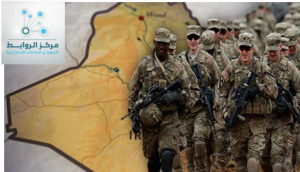Muammar Faisal Khouli
Translated by : mudhaffar al-kusairi
In the aftermath of the assassination of the Quds Force commander of Iran, Qassem Soleimani, and the deputy head of the Iraqi Popular Mobilization Committee, Abu Mahdi Al-Muhandis, the Iraqi Council of Representatives on January 5 issued a resolution calling for the removal of foreign forces from Iraq… This decision angered the American administration, which threatened If American forces leave Iraq in an “unfriendly” manner, Iraq will face sanctions never seen before.
But the United States of America may surprise Iraq with more bitter sanctions than the aforementioned sanctions, such as encouraging the idea of dividing it into three “Kurdish, Sunni, and Shi’ite” states, this idea would worry the Iranian state, because Iran built its regional project in the post-Saddam Hussein era and the Arab Spring, on a weak Iraq that is easy to control, and not a divided Iraq with which it is difficult to implement its project or perhaps lead to its cancellation.
So the Iranian leadership may use all of its tools in Iraq to nullify this project.
But this idea may find a Sunni and Kurdish welcome alike. The project to rebuild the Iraqi state in the post-2003 period, on the foundations of the democratic system, has so far proven unsuccessful… Politically, Iraq has failed to establish the rules for the peaceful transfer of power away from sectarian quotas and ethnicity… As for civil, Iraq witnessed a flagrant violation of human rights, and economically, Iraq comes in the forefront of countries that “flourish” with financial and administrative corruption, since 2003 AD and until now Iraq has been subjected to organized financial plunder, reaching nearly 500 billion US dollars, this huge number was the guarantor of the reconstruction of Iraq, making it Singapore of the Levant, after of lean years as a result of wars and sieges.
As for security, and with the spread of the phenomenon of armed militias, Iraq has suffered a lot from the security aspect , as it currently clearly contributes to eliminating the movement of massive protests that swept the Iraqi capital, Baghdad, central and southern the country through the killing, kidnapping and assassination of protesters, and the Iraqi state has been , especially its executive and legislative institutions , run by armed factions that are working to establish Iranian influence in Iraq, and some of those factions have fought – and are still fighting – alongside Iran in Syria and Yemen.
As for the military, the Iraqi military establishment was severely weakened until the terrorist organization ISIS came to the outskirts of Baghdad without much trouble in the summer of 2014.
Against this, from a Sunni and Kurdish point of view, the continuation of this system, which is an extension of the pre-state stage, and becomes the natural recipe for governing Iraq, as this would pose a great danger to their interests in the present and future, so it may be inevitable for the Sunnis of Iraq to get rid of that Iranian regime and influence in Iraq, and move forward in the implementation of what has been termed the “Sunni” Western Region project, while the Kurds of Iraq will go forward in the realization of their long-awaited national dream in establishing an independent Kurdish state. There is no doubt that this project may have dangerous consequences if imposed by force without any peaceful Iraqi agreement on it, it may open the doors of civil war.
The United States of America understands that the decision to remove its forces from Iraq came with an Iranian request as a political response to the assassination of Qassem Soleimani, and the idea of dividing Iraq may be the American response to that decision.
It seems that the destiny of Iraq in the period after 2003 AD, to continue to be a fertile ground for settling scores between Washington and Tehran.
As for the question that arises in this context: Will the United States of America allow Iran and China to enjoy the riches and strategic location of Iraq after its withdrawal from it?! But in order not to enjoy this, and also to preserve its interests in it, will the United States of America split it, as it divided – in light of international rivalry with the Soviet Union in the phase of the cold War – Germany was divided “East and West” and Korea was divided to “North and South” Korea , or are their historical contexts that are different from the current situation?
It is very painful for the division to be the final scene of the future of Iraq , and here we must say that the arrival of Iraq to that scene is not only due to the desire of the USA , but rather the political class that ruled Iraq in the period after April 2003 AD , bears the burden of that scene through its disastrous policies . That , class , from 2003 AD to the present day , reinforced social anxiety in Iraq , which later became the regulator of the relations of its social components , thus producing a failed state that was moving at a rapid , slow , or winding pace towards partition .
Rawabet Center for Research and Strategic Studies

